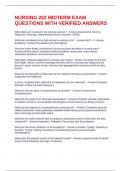NURSING 202 MIDTERM EXAM
QUESTIONS WITH VERIFIED ANSWERS
What steps are involved in the nursing process? - Answer-Assessment, Nursing
Diagnosis, Planning, Implementation and Evaluation. ADPIE.
What are considered to be high priority in nursing care? - Answer-ABC + V. Airway,
Breathing, Cardiac [Circulation] and Vital Signsw
What are some things considered to be second level priorities in nursing care? -
Answer-Mental status, untreated medical problems, acute pain, acute urinary
elimination problems, abnormal labs and risks
What does relational approach to nursing care mean? - Answer-Accounts for the fact
that health, illness, and the meanings that they hold for a person are shaped by the
person's social, cultural, family, historical and geographical contexts as well as other
factors.
What are the two types of data that can be collected during an assessment? - Answer-
Subjective and Objective
In terms of patient data, what kind of databases can be collected? - Answer-Complete,
Episodic, Follow-Up and Emergency
What are the two types of assessments conducted? - Answer-Focused and
Comprehensive
What are the aspects of a focused assessment? - Answer-Problem oriented, dependent
on patient concerns, and evaluates the progress of interventions on those concerns
What are the aspects of a comprehensive assessment? - Answer-Completed upon an
initial assessment, when gathering a detailed health history and physical examination
and a thorough overall health status
What are the skills involved with an objective assessment and in what order are they
conducted? - Answer-Inspection, Palpation, Percussion and Ausculatation
What are the seven attributes of all symptoms? - Answer-Location, Quality, Quantity or
Severity, Timing, Setting, Remitting or exacerbating factors and associated
manifestations
What does the general survey of the patient include? - Answer-Apparent state of health,
level of consciousness and signs of distress.
, What are the four vital signs? - Answer-Blood pressure, respiratory rate, heart rate and
temperature
What are some questions we ask a patient prior to taking a blood pressure? - Answer-1.
Have you smoked in the last 2 minutes?
2. Have you had anything hot or cold to drink in the last 20 minutes?
3. Have you had anything caffeinated to drink this morning?
What are some factors that can affect the blood pressure? - Answer-age, gender, race,
weight, diurnal cycle, stress, emotions, medications, exercise.
What is the ideal blood pressure reading? - Answer-120/80
What are the methods to take temperature? - Answer-Rectal, Oral, Axillary and
Tympanic Membrane
What is the degree difference between axillary and oral temperature? - Answer-0.5
degrees lower
What is the degree difference between rectal and oral temperature? - Answer-0.5
degrees higher?
What is considered to be the normal range for temperature? - Answer-35.8 - 37.3
degrees Celsius
What are some influences on temperature? - Answer-Diurnal cycle (increased in the
morning and evening), menstruation cycle, exercise, age (decreases as we age),
exposure to cold, surgery, infection
At what arteries can you measure pulse at? - Answer-Brachial, carotid, femoral, dorsalis
pedis, tibialis posterior, popliteal
What is the grade force scale values for measuring pulse? - Answer-0 = absent
1+ = weak, thready
2+ = normal
3+ = full, bounding
How long do we measure pulse for? - Answer-30 seconds for a regular rhythm and 60
seconds for an irregular rhythm.
What are some factors that influence pulse? - Answer-Exercise, fever, medication, pain,
infection, dehydration and fear/anxiety
What is the acceptable pulse rate for newborns? - Answer-70-190
What is the acceptable pulse rate range for children - Answer-(70-110)




